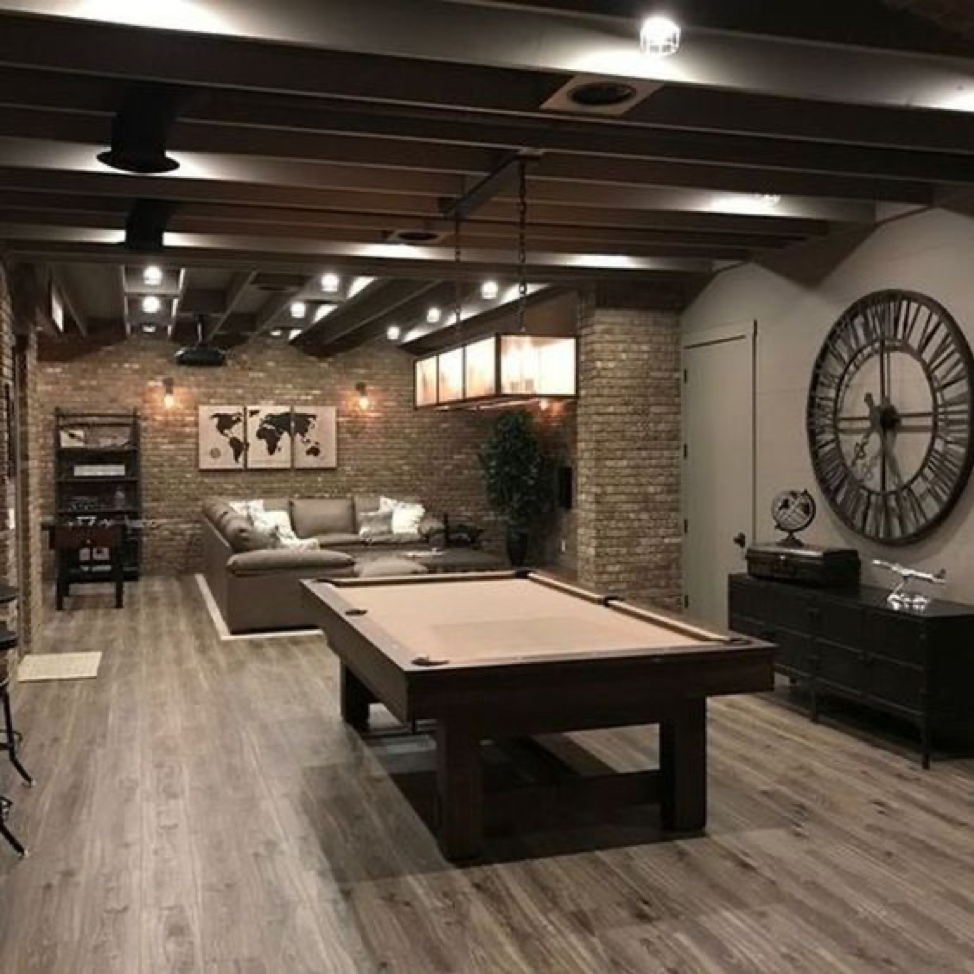Whether you have a small or large basement, your basement space holds a lot of potential. It can be a place for extra storage, an additional bedroom or living space, or a place for you and your family to gather on a Friday night. A finished basement is a cost-efficient project that will provide you with more space in your home. If you are ready to start on your basement remodel, there are a few things you should know.
1. Understand the codes
You might have some big dreams for your basement but when the time comes to get started, you might run into some hurdles because of building codes. It is important that you work with a contractor that understands building codes that are applicable to completing a basement project. Most basement projects require plumbing and or electrical work which will likely require licensing or permits.
For instance, if you plan to close off the laundry room from the rest of the basement area, there may be a code that pertains to the project that should be taken into consideration.
Sometimes, there are building codes regarding ceiling height. In some jurisdictions, you will be required to meet a certain ceiling height of about seven or eight feet. That means you might either have to relocate your ducts/pipes or lower your concrete floor. In that case, you will want a contractor that understands the codes so the right steps could be taken. If building codes are not followed properly, you might find yourself in a sticky situation.
2. Moisture Control
A big mistake some people make with basement finishes is hiding the present issues with new floors, ceilings, or drywall. It might look great at first, but could lead to problems in the future. For instance, if you have moisture in basement materials and cover it up with drywall, eventually that drywall will become damaged and you will have an even bigger issue down the road.
You will also want to check your gutters because water can move in the down-sprouts and make its way through your walls. A contractor will help you inspect the land around your home so that water makes its way away from your foundation and not into your home.
You may have heard horror stories about flooded basements, or maybe even experienced it yourselves. To avoid spending thousands of dollars down the road, it is important to have a backup pump system put in. The backup system will take over your main pump in the event the main pump malfunctions because of a power outage.
You will also want to identify any water issues. Before jumping into construction, look out for appliances such as heaters or washers that might be damaged. You will also want to check for puddles of water, dripping walls, water stains, or cracks in the foundation. By identifying these water issues upfront, you will be able to fix them before finishing the basement.
3. Build a Floor Plan
It is critical to build a floor plan so that, when the basement is finished, it fits your lifestyle the way that it should. What will your basement be used for? Storage space? An in-law suite? An additional media room? By considering what it will be used for, you can include everything that is necessary.
4. Get rid of humidity
Humidity in the basement can cost you in the long run. You can spend thousands of dollars to finish the basement and it can quickly become ruined with humidity problems. Too much humidity can cause mold growth and smelly air. Make sure your contractor keeps humidity levels at an acceptable range so that you can avoid those problems.
5. Check out the windows
If your windows are rusty or rotting, now is the time to replace them. You might also want to ask your contractor to check any egress windows in your basement. An egress window might cause water to enter your basement if they were not installed the right way. The base of a window should consist of 6-8 inches of free-draining material so that leaves or sticks don’t get caught in the window.
6. Leave Space Around Mechanicals
Wouldn’t it be a nightmare to finish your basement, only to find there is not enough room for people to get around your mechanicals like your boiler? This could be a serious problem down the road and could cost you thousands of dollars trying to resolve.
7. Don’t Underestimate Lighting
If you are hoping to save a few dollars in parts of your basement, don’t let it be the lighting. Unlike other parts of your home, there is not enough sunlight to keep the rooms bright. Some rooms in the basement might not have any windows at all. When it comes to lighting, go with the brightest quality lights you can find!
8. Check for Gas Levels
The Environmental Protection Agency (EPA) recommends that all homeowners run a radon test in their home because naturally occurring gas is linked to health complications. If you did have a gas problem, that you discovered after your basement was finished, you might be faced with bigger problems. Save yourself the trouble and do it upfront!
9. Work with an Expert
Finishing a basement is not a DIY project. Lots of things can go wrong with basement projects and it is best to not take your chances. Don’t waste your time and money doing it yourself or working with someone who is inexperienced.
Legacy Renovations: Building Your Dream Basement
Whether you are ready to build that guest room your in-laws have been begging for, or your kids are begging for you for a movie room, or you need an additional space to entertain guests, Legacy Renovations is here to help you finish your dream basement!
Ready to get started on your basement? Contact our team today!



